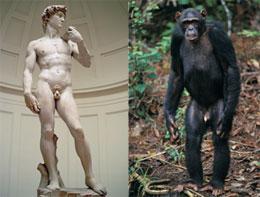
Thanks to Geraldine F and Nathalie M for the links :)
From the scientist
By MEGAN SCUDELLARI
Big brains and spineless penises - How DNA deletions may have produced uniquely human traits
Hundreds of deletions in non-coding DNA have helped sculpt human evolution, including an increase in brain size and the loss of sensory whiskers and penis spines, proposes a study published this week in Nature.
"The molecular basis of becoming human is one of the great problems in biology," said senior author David Kingsley of Stanford University. "There have been suggestions from multiple organisms that changes in non-coding regions were likely to be important," he added, and with the availability of the human genome sequence, "we have an incredibly exciting opportunity to start to address that question."
For over a decade, Kingsley's lab has studied the genetic basis of evolution in stickleback fish, and found time and again that major morphological differences can be tracked to deletions in regions of DNA surrounding key developmental genes. To see if the same was true for human evolution, Kingsley and colleagues compared the human and chimpanzee genomes, identifying 583 human-specific deletions. They then narrowed the list to sequences likely to have an important function by looking for those which are highly conserved across other organisms, including rhesus macaques, mice, and chickens.
"This is a clever thing to do," Svante Paabo, director of the department of genetics at the Max Planck Institute for Evolutionary Anthropology who was not involved in the research, wrote in an email to The Scientist. "As with many good ideas, it seems almost obvious in hindsight."
The team's final list included 510 DNA deletions, highly conserved across animal species but absent from the human genome. All but one of the deletions mapped to non-protein coding regions, and many were near genes involved in steroid hormone signaling and neural function.
The team closely analyzed two of the deletions and their potential contribution to human evolution. One, a deletion near tumor suppressor gene GADD45G, may have removed the brakes from cell division and promoted the expansion of brain tissue, contributing to the increase in brain size of humans over other primates. A second, a deletion near the human androgen receptor gene, correlates with the loss of sensory whiskers and penile spines, which mice and other primates still have, but humans (thankfully) lack.
"There's a good chance some of these deletions contributed to the evolution of human traits," wrote James Noonan, a geneticist at Yale University School of Medicine who was not involved in the research, in an email. Still, the paper's speculations about how the deletions influence brain size or penile spines are "premature," he wrote. "All we know is that these deletions remove regulatory elements; we don't know what that means for human biology yet."
To find out, Kinglsey and his team are now recreating the deletions in mice to see if the removal of corresponding DNA sequences results in neural expansion or the loss of whiskers and penile spines. They will also continue to look at other deletions on the list for involvement in additional human traits. "Just 508 to go," said Kingsley with a laugh.
Reference
McLean, C.Y., et al., "Human-specific loss of regulatory DNA and the evolution of human-specific traits," Nature, 471:216-9.
Abstract
Humans differ from other animals in many aspects of anatomy, physiology, and behaviour; however, the genotypic basis of most human-specific traits remains unknown1. Recent whole-genome comparisons have made it possible to identify genes with elevated rates of amino acid change or divergent expression in humans, and non-coding sequences with accelerated base pair changes2, 3, 4, 5. Regulatory alterations may be particularly likely to produce phenotypic effects while preserving viability, and are known to underlie interesting evolutionary differences in other species6, 7, 8. Here we identify molecular events particularly likely to produce significant regulatory changes in humans: complete deletion of sequences otherwise highly conserved between chimpanzees and other mammals. We confirm 510 such deletions in humans, which fall almost exclusively in non-coding regions and are enriched near genes involved in steroid hormone signalling and neural function. One deletion removes a sensory vibrissae and penile spine enhancer from the human androgen receptor (AR) gene, a molecular change correlated with anatomical loss of androgen-dependent sensory vibrissae and penile spines in the human lineage9, 10. Another deletion removes a forebrain subventricular zone enhancer near the tumour suppressor gene growth arrest and DNA-damage-inducible, gamma (GADD45G)11, 12, a loss correlated with expansion of specific brain regions in humans. Deletions of tissue-specific enhancers may thus accompany both loss and gain traits in the human lineage, and provide specific examples of the kinds of regulatory alterations6, 7, 8 and inactivation events13 long proposed to have an important role in human evolutionary divergence.







2 comments:
What are they talking about? 10% of men still have them (in rudimentary form): just google
Hirsuties papillaris.
Horse And Wagon
It's Culture That Modifies Genetic Changes, Not Genetics That Modifies Culture!
"How DNA deletions may have produced uniquely human traits"
http://www.the-scientist.com/news/display/58044/
With such a title you don't need to read the article, that would apparently explain how a wagon pulls the horse.
See
"Seed of Human-Chimp Genomes Diversity"
http://pulse.yahoo.com/_2SF3CJJM5OU6T27OC4MFQSDYEU/blog/articles/53079
Dov Henis
(Comments from 22nd century)
http://www.the-scientist.com/community/user/profile/1655.page
"Evolution, Natural Selection, Derive From Cosmic Expansion"
http://darwiniana.com/2010/09/05/the-question-reductionists-fear/
Post a Comment